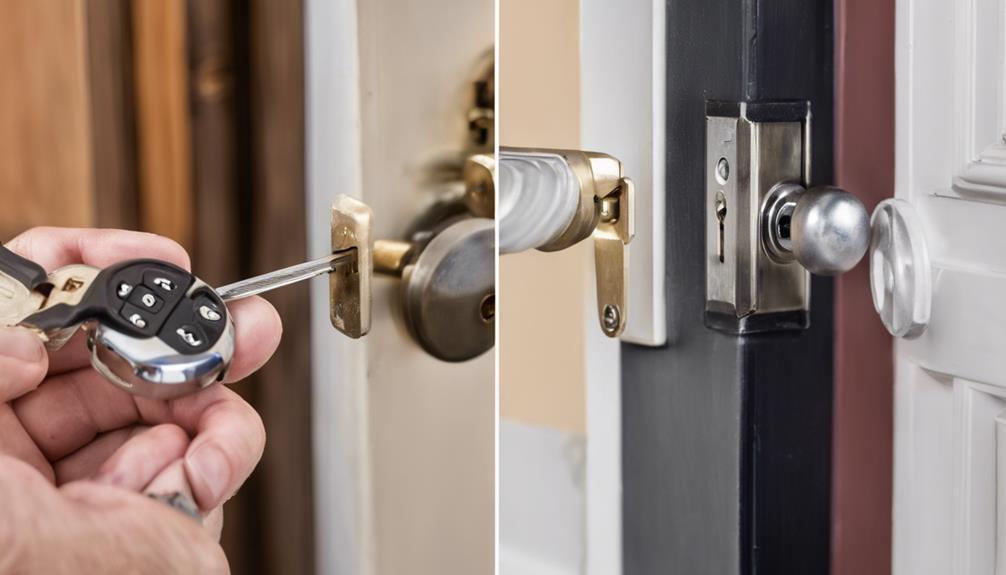When choosing between re-keying and lock replacement, consider your security needs. Re-keying modifies your current locks to make old keys useless, which is cost-effective and quick, usually under an hour and costing $20 to $50. It's ideal for situations like losing keys or moving. On the other hand, lock replacement involves installing new locks, which can range from $50 to $300 and offer advanced security features. This is better if your locks are old or damaged. Balancing cost and security is key to making the best choice for your property. There's much more to explore on this topic.
Key Takeaways
- Re-keying is more cost-effective, ranging from $20 to $50 per lock, while lock replacement costs between $50 to $300.
- Re-keying is ideal for situations like losing keys or moving, while replacement is better after break-ins or for outdated locks.
- Lock replacement offers enhanced security features and durability compared to older locks, which may be worn or ineffective.
- Re-keying retains existing hardware, reducing waste, while replacement provides an opportunity for upgraded lock technology and customization.
- Regular evaluations of your locks can help determine whether re-keying or replacement is necessary for optimal security.
Understanding Re-Keying
When you need to enhance your security without replacing your entire locking system, re-keying is often the best option. You'll find that lock rekeying or replacement presents different approaches to securing your space.
With re-keying, you modify the internal mechanism of your existing locks so that old keys no longer work. This method can save you money and effort while providing a fresh start. Additionally, re-keying allows you to maintain the aesthetic of your current hardware while still improving security (understanding lock re-keying).
When considering rekeying vs replacing locks, weigh the pros and cons of each. Re-keying is typically less expensive and quicker, making it a convenient solution for many situations. It's especially beneficial if you've lost keys or moved into a new home.
However, it may not be suitable if your locks are damaged or outdated, in which case replacement is the better choice.
Ultimately, understanding re-keying allows you to make informed decisions that best serve your needs and those of others. Whether you choose to re-key or replace locks, ensuring the safety and security of your environment is paramount.
Benefits of Re-Keying
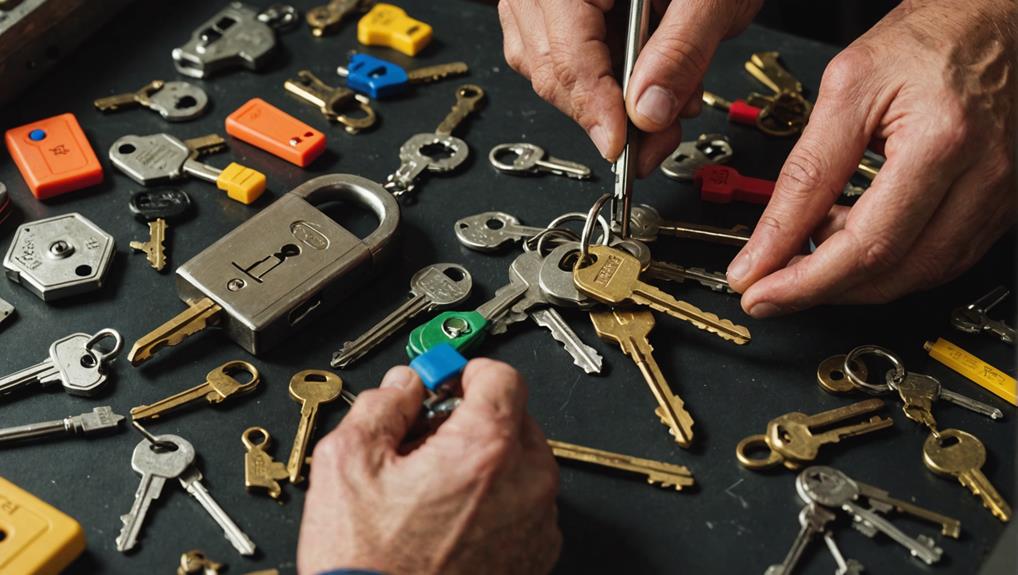
Re-keying offers several advantages that make it an appealing choice for enhancing security. When you need to secure your home or business efficiently, re-keying can provide peace of mind without the expense of a full lock replacement. It's a quick process, allowing you to maintain security with minimal disruption.
Here's a breakdown of the benefits:
| Advantage | Description | Considerations |
|---|---|---|
| Cost-Effective | Re-keying is generally cheaper than lock replacement. | Great for those on a budget. |
| Fast Process | Most re-keying jobs can be completed in under an hour. | Ideal for urgent security needs. |
| Retains Existing Hardware | You keep your current locks, preserving aesthetics. | No need for new keys or hardware. |
| Customization | You can change the keying to fit your specific needs. | Tailored security for your situation. |
In deciding which is better—re-keying or replacing—consider these benefits. With a lock replacement guide in hand, you'll be empowered to make the right choice for your security needs. Re-keying is often a smart, practical solution that helps you serve others by ensuring their safety without unnecessary costs.
When to Choose Re-Keying
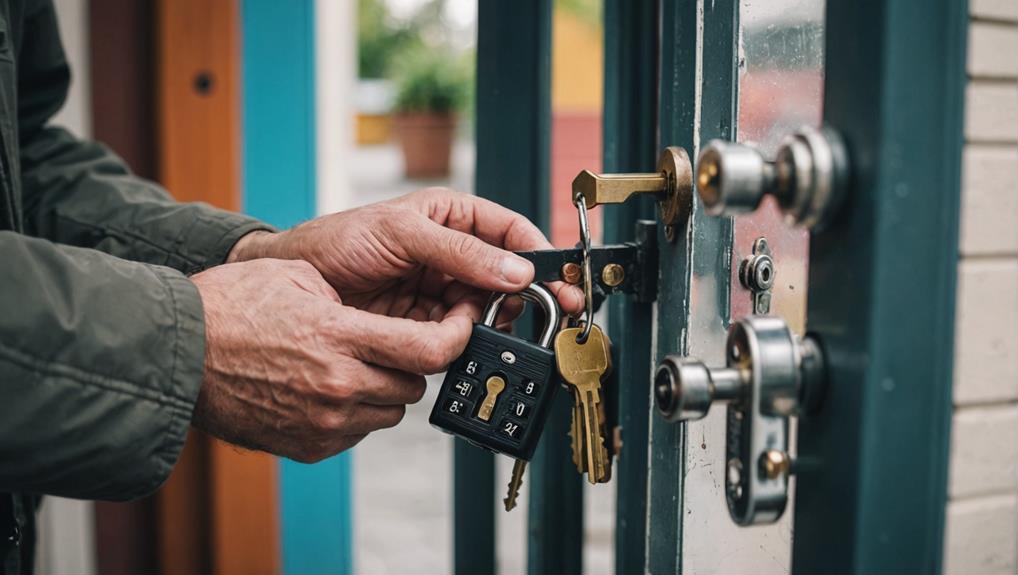
If you've recently moved into a new home or office, or if you've lost track of who's copies of your keys, choosing to re-key your locks can be a smart move.
Re-keying is an excellent option when you want to enhance security without the expense and hassle of replacing the entire lock. This method not only saves you money but also guarantees that your property remains secure, as it addresses previous access that may still exist. If you suspect that previous tenants, employees, or anyone else may still have access, re-keying gives you peace of mind.
Another scenario where re-keying shines is when your keys get lost or stolen. Instead of worrying about unauthorized access, you can quickly re-key your locks to guarantee that only you and your trusted individuals have access.
It's a practical solution that saves you time and money, while still providing the security you need. By choosing to unlock savings with re-keying, you can enjoy both security and cost-effectiveness.
If you're also looking to maintain a consistent look across your locks, re-keying can help. By having all your locks operate with one key, you streamline access, making it easier for you and your family or staff.
Ultimately, re-keying is a straightforward way to secure your space while serving your community and guaranteeing everyone feels safe.
Understanding Lock Replacement
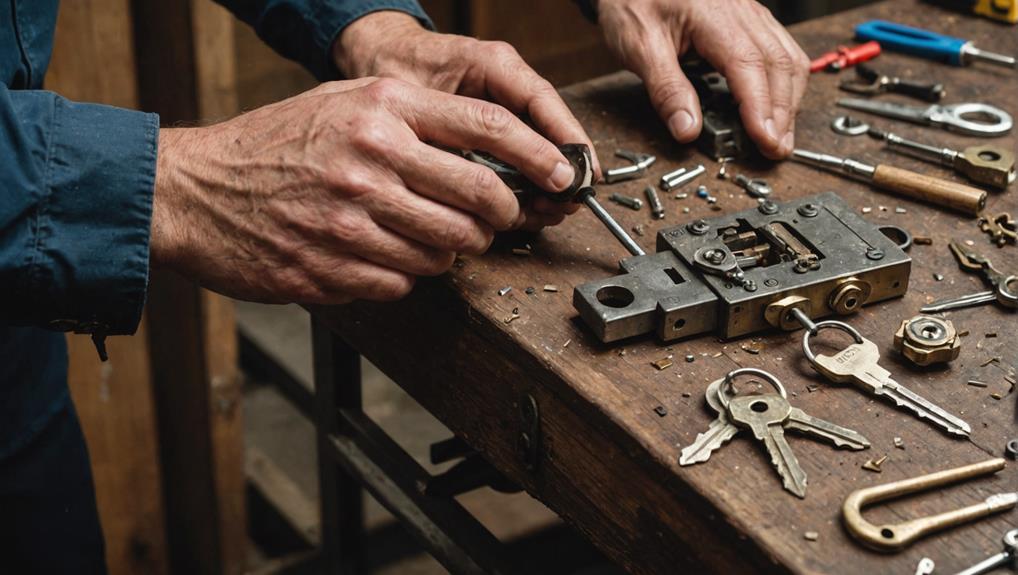
When you're considering lock replacement, it's important to understand the different types available and how they fit your needs.
Factors such as the type of lock, brand, and installation complexity can greatly affect the overall cost.
You'll also want to factor in the costs and the enhanced security benefits that come with a new lock, including understanding lock replacement costs.
Knowing these aspects can help you make an informed decision that protects your home.
Types of Lock Replacements
Before deciding on a lock replacement, it's essential to understand the different types available. Each type serves unique needs and can enhance security in various ways.
When you're committed to providing safety for yourself and others, knowing your options helps you make informed choices.
Here are five common types of lock replacements you might consider:
- Deadbolts: These locks offer strong security and are often used on external doors.
- Smart Locks: Integrating technology, these locks allow keyless entry and can be controlled via smartphone apps.
- Lever Handle Locks: Common in commercial settings, they provide ease of access and are often ADA compliant.
- Mortise Locks: These are complex locks typically used in high-security applications, providing robust protection.
- Cylinder Locks: Versatile and easy to replace, these are commonly found in residential settings.
Cost Considerations
Understanding the costs associated with lock replacement is essential for making the right choice. When you evaluate replacing a lock, you'll want to factor in both the price of the lock itself and the installation costs.
On average, a basic lock can range from $30 to $100, while more advanced locks, like smart locks, can cost upwards of $200. Additionally, hiring a locksmith for installation typically adds another $50 to $150, depending on the complexity of the job.
You might also need to assess the long-term value of a lock replacement. While re-keying is often cheaper upfront, a new lock can offer greater durability and enhanced security features.
If you're looking to serve your community by ensuring safety in shared spaces, investing in reliable locks could be a worthwhile expense.
Lastly, don't forget about potential discounts. Some locksmiths offer promotions or package deals, especially if you're replacing multiple locks at once.
Security Benefits
Investing in a new lock can considerably enhance your property's security. When you choose to replace your locks, you're not just upgrading the hardware; you're taking proactive steps to protect your loved ones and belongings.
A new lock can provide peace of mind and a sense of safety in your home or business. Here are some key security benefits you can expect:
- Improved Technology: Modern locks often come with advanced features like smart technology and keyless entry.
- Higher Durability: New locks are generally more resistant to wear and tear, making them harder to tamper with.
- Enhanced Key Control: With a new lock, you can get unique keys that are harder to duplicate, limiting access to authorized individuals only.
- Better Resistance to Break-Ins: Upgraded locks offer better protection against forced entry, deterring potential intruders.
- Customized Security Solutions: You can select locks tailored to your specific security needs, providing you with the best fit for your situation.
Benefits of Lock Replacement
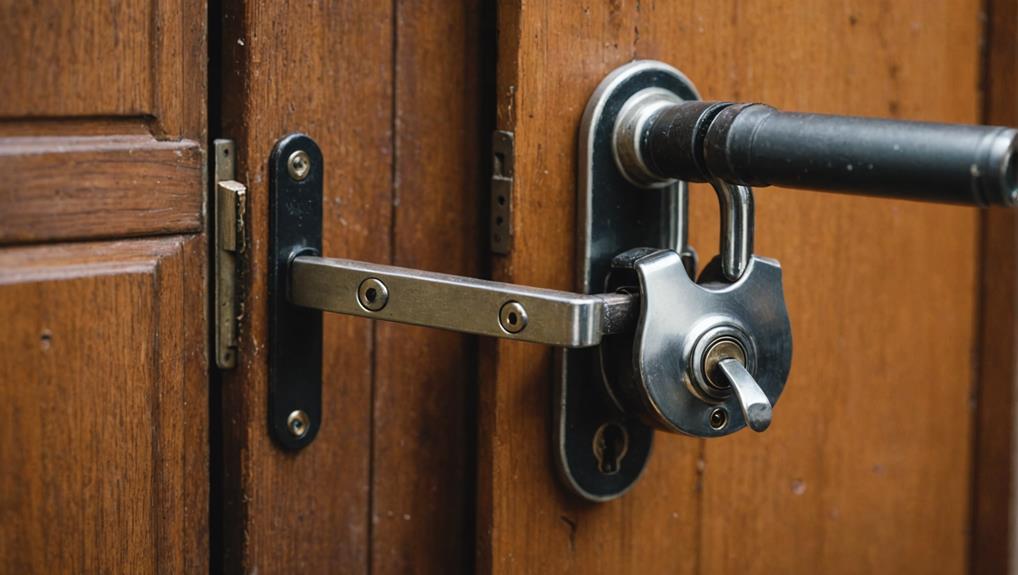
When you choose to replace your locks, you'll enjoy enhanced security features that keep your home safe, which is particularly essential for businesses looking to protect their assets.
Additionally, modern locks often come with advanced technology such as electronic access control systems, making them a smart choice for commercial properties as well essential lock replacement for business security.
You'll also benefit from increased durability and reliability, ensuring your locks stand the test of time.
Plus, you can explore customization options that fit your style and needs perfectly.
Enhanced Security Features
Lock replacement offers a significant upgrade in security that re-keying simply can't match. When you choose to replace your locks, you're not just changing the key; you're enhancing the overall security of your space. This is essential for anyone looking to protect their loved ones and belongings.
Here's what makes lock replacement a superior choice:
- Advanced Lock Technology: New locks often incorporate the latest security features, such as smart technology.
- Unique Key Designs: Modern locks can use keys that are harder to duplicate, reducing the risk of unauthorized access.
- Higher Resistance to Picking: Newer locks typically come with improved mechanisms that are more difficult to pick or tamper with.
- Customizable Security Options: You can select locks tailored to your specific needs, whether for your home or business.
- Enhanced Insurance Benefits: Many insurance companies offer discounts for properties with high-security locks, protecting your investment.
Increased Durability and Reliability
Replacing your locks not only enhances security but also boosts durability and reliability. When you opt for lock replacement, you're investing in high-quality materials designed to withstand wear and tear.
Older locks can weaken over time, making them more susceptible to break-ins and malfunctions. By choosing to replace them, you guarantee that your property is protected by robust, modern mechanisms that work when you need them most.
New locks are often constructed from advanced materials, providing better resistance to environmental factors like moisture and corrosion. This means they'll last longer, requiring less frequent maintenance or replacement.
Additionally, reliable locks function smoothly, reducing the chances of frustrating lockouts or mechanical failures.
For those who prioritize service to others, installing durable locks can also benefit your family, guests, and clients. You're creating a safer environment, showing that you care about their well-being.
Reliable locks contribute to peace of mind, allowing everyone to go about their daily activities without worry. Ultimately, lock replacement isn't just about security; it's about guaranteeing a dependable and lasting solution that serves everyone involved.
Customization Options Available
Upgrading your locks opens the door to a variety of customization options that can enhance both security and convenience.
When you opt for lock replacement, you're not just choosing a new mechanism; you're also selecting features that best serve your needs and those of the people you care about.
Here are some appealing customization options:
- Smart Locks: Control access remotely and monitor who enters your home.
- Keyless Entry: Eliminate the need for keys, making it easier for family members or trusted friends to access your space.
- Multiple Access Levels: Grant different access rights to various users, ensuring safety for everyone.
- Aesthetic Choices: Match the lock design and finish to your home's décor for a cohesive look.
- Alarm Integration: Enhance security by connecting your locks to an alarm system that alerts you of unauthorized access.
When to Choose Lock Replacement
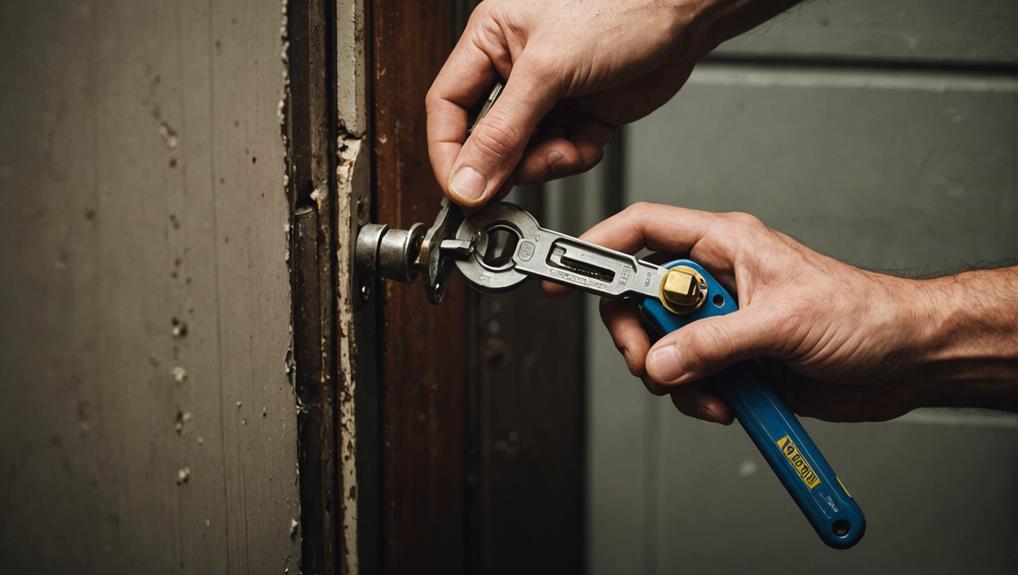
When security is a top priority, choosing lock replacement can be a smart decision. If you've recently experienced a break-in, lost your keys, or moved into a new place, replacing your locks gives you peace of mind. It guarantees that only you and those you trust can access your home or business.
Additionally, understanding the costs involved in lock replacement can help you make an informed choice that fits your budget. Lock replacement is also beneficial if your current locks are outdated or showing signs of wear. Older locks can be easier for intruders to compromise, so upgrading to modern, high-security options can greatly enhance your safety. This is especially important if you have valuable assets or vulnerable family members to protect.
Moreover, if you're serving others, such as running a daycare or a community center, guaranteeing robust security measures is essential. Your clients or guests rely on the safety of the environment you provide.
In these situations, lock replacement serves not just as a protective measure for you but also reflects your commitment to the well-being of those around you. By prioritizing security through lock replacement, you're taking a proactive step toward creating a safer space for everyone involved.
Cost Comparison
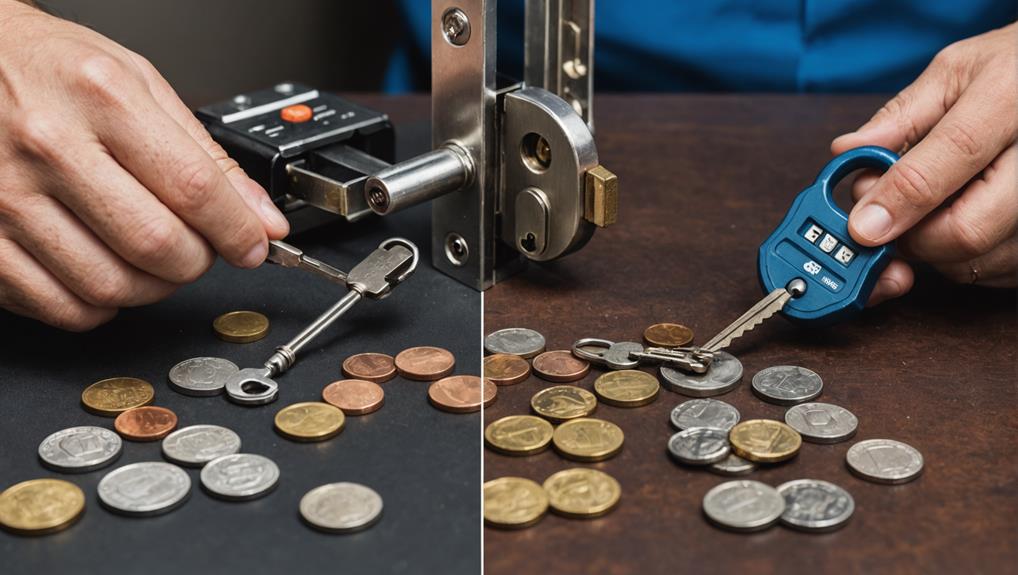
Choosing between re-keying and lock replacement often comes down to cost considerations. Re-keying is generally the more budget-friendly option. It allows you to enhance security without the expense of a new lock, making it particularly appealing for those with tight budgets or who prioritize immediate cost savings.
However, if the locks are old or damaged, replacement might be the better investment in the long run, especially given the security insights that suggest newer locks often come with advanced features.
Here's a quick cost comparison:
- Re-keying: Typically costs between $20 to $50 per lock.
- Lock Replacement: Can range from $50 to $300, depending on the type and brand.
- DIY vs. Professional: Re-keying can often be a DIY project, while lock replacement usually requires professional installation.
- Long-Term Savings: Investing in quality locks may reduce future security costs.
- Value of Security: Consider the peace of mind that comes with a reliable locking system.
Ultimately, you'll want to weigh the initial costs against the potential benefits.
If you're serving others, think about how the choice impacts their safety and well-being. Choosing wisely can help protect not just your property but also the people you care about.
Security Considerations
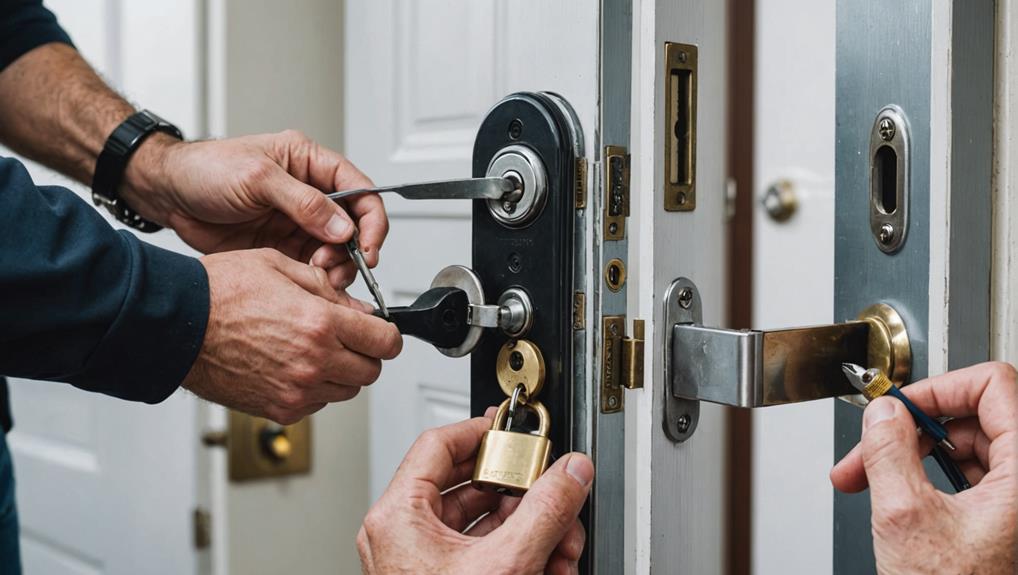
Security is paramount when deciding between re-keying and lock replacement. You want to guarantee that your loved ones and belongings are safe, and each option has its merits.
Re-keying can be a quick fix, especially if you've lost keys or have concerns about unauthorized access. It changes the internal workings of the lock, rendering old keys useless, which is often sufficient for many situations. However, it's important to take into account that cost-effective solutions like re-keying may not fully address more serious security concerns.
However, if your locks are outdated or compromised, replacing them might be the better choice. Newer locks often come with advanced security features, such as smart technology or pick-resistant designs, enhancing your home's overall security.
It's also worth reflecting on the condition of your existing locks—if they're worn or damaged, re-keying won't address underlying vulnerabilities.
Ultimately, think about the level of security your environment requires. If you serve others by providing a safe space, opt for the more secure solution.
Regularly assess your security measures and stay informed about the latest advancements in lock technology. This proactive approach guarantees you're making the best choice for the safety and well-being of those you care about.
Frequently Asked Questions
Can I Re-Key a Digital or Smart Lock?
Yes, you can re-key some digital or smart locks, but it depends on the specific model.
Many smart locks allow you to change access codes or user permissions, effectively re-keying the lock for new users.
However, if your lock doesn't support this feature, you might need to evaluate a different approach, like replacing the lock entirely.
Always check the manufacturer's instructions to see what options you have for enhancing security and access.
How Long Does the Re-Keying Process Take?
When it comes to re-keying, you'll find it's a piece of cake!
The process typically takes about 15 to 30 minutes, depending on the complexity of the lock. You can often do it yourself with a re-keying kit or call a locksmith if you're not comfortable.
Either way, you can quickly change your locks' keys, ensuring your space remains secure and giving you peace of mind for those you serve.
Will Re-Keying Void My Lock's Warranty?
Re-keying typically won't void your lock's warranty, but it's essential to check the manufacturer's guidelines first.
Most brands allow this process since it doesn't alter the lock's core structure. You're taking a smart step towards enhancing security while keeping your expenses down.
However, if you're unsure, reaching out to the manufacturer or a locksmith can provide clarity. It's always best to stay informed before making any changes to your locks.
Can I Perform Re-Keying Myself?
Yes, you can perform re-keying yourself if you have the right tools and a bit of know-how.
Most lock sets come with a re-keying kit, which includes everything you need. Just follow the instructions carefully, and make certain you understand how the lock mechanism works.
However, if you're unsure or uncomfortable, it might be best to call a professional to guarantee your locks function properly and securely.
What Tools Are Needed for Lock Replacement?
To replace a lock, you'll need a few essential tools.
Start with a screwdriver—both flathead and Phillips types are useful. A wrench may come in handy for removing the old lock.
You'll also need a new lockset, of course! A drill is useful if you need to make new holes.
Finally, a measuring tape guarantees your new lock fits perfectly.
With these tools, you can confidently tackle the lock replacement process.
Conclusion
In the battle of re-keying versus lock replacement, you've got the keys to your security. Think of re-keying as a quick tune-up for your locks, while replacement is like getting a brand-new engine for your car. Both have their merits, but the choice ultimately hinges on your needs and budget. As you weigh your options, remember that your safety is paramount; choose the path that wraps your home in a protective embrace.

